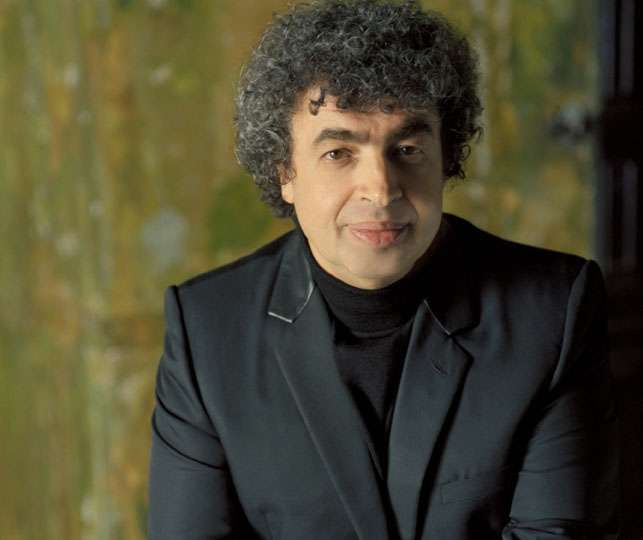|
Back
Highest Mountains to Deepest Thoughts New York
Isaac Stern Auditorium, Carnegie Hall
10/14/2012 -
Richard Wagner: Overture to Tannhäuser – Wesendonck Lieder (orch. Felix Mottl/Wagner)
Richard Strauss: Eine Alpensinfonie, opus 64
Michelle DeYoung (Mezzo-Soprano)
The MET Orchestra, Semyon Bychkov (Conductor)

S. Bychkov (© Sheila Rock)
What a sunlit concert the MET Orchestra presented for this warm New York afternoon. Three pieces for large orchestra, one song-cycle that only the most luxuriously endowed could perform. And a pair of composers who virtually typified late 19th Century gargantuan orchestra, sumptuous projects–and no shame whatsoever in composing chords which ended with a cadence of tonic to dominant.
Not that Richard I or Richard II–Wagner or Strauss–ever worried about usng massive forces. In fact, Richard Strauss’s Alpine Symphony (a 1915 throwback to the 19th Century) not only had 55 minutes of non-stop orchestra, but it included an organ, a few pair of offstage brass and no less than twelve French horns which were heard but never seen.
It is a luscious piece of music, but the last time I heard it live was in Hong Kong, where, no less a titan than Sergiu Celibidache conducted his orchestra. He was so meticulous that everything seemed slower than it should have been. But in this last years (and I believe Hong Kong was a few months before his departure from this life), Strauss’ mountain side walk was a long, slow, grinding laboring trip up the mountains, far from Strauss’s memory of a teenage saunter.
That was hardly the effort of that superb Russian heir to Gergiev, Semyon Bychkov. He is certainly meticulous and careful–those offstage brass choirs cane in with pinpoint accuracy, all twelve horns playing without a single error–but he created a living breathing organism from the work.
Some conductors find this final Strauss tone-poem unwieldy, cumbersome. But you could never find that with Mr. Bychkov, who reveled in Strauss’s wonderful orchestration. Literally, every raindrop was accented, the thunderstorm was frightening, the vision of the sun was glorious.
Gustav Mahler tried the same musical climbs to higher vistas, but, as Strauss pointed out, he was Jewish. Ergo, his music had doubts. Neither Strauss nor Bychkov never doubted that the Alpine climb was a joyous diversion. The orchestral forces were Alpine, the Strauss movements (written in great detail) were like a mountaineer’s diary–but the effect with these 125 players could have been Himalayan. This performance, though, was so radiant that one thought less of spirituality and gurus than the conquering of a very European mountain world.
Strauss’s first “draft” was as a teenager (where he said it was a Wagnerian monstrosity). But he soon learned that Wagner had much to teach him. And in Bychkov’s opening Overture to Tannhäuser–a work which the MET Orchestra must know by heart–he gave this early Wagner work a stateliness and breadth that was rare indeed.
But the rarest work was Wagner’s "Wesendonck” Lieder, written when the composer took refuge in Otto Wesendonck’s large house and promptly seduced Otto Wesendonck’s poetess wife. Inspired by her words, he wrote five songs which, when sung by the right person, are haunting, not exactly lyrical like Strauss, but hushed, chimerical.

M. DeYoung (© Christian Steiner)
The original singer was supposed to be Eva-Maria Westbroek, but due to illness, Michelle DeYoung took over. Despite the iconic Kirsten Flagstad recording, I had always felt that the dark atmospheric songs deserved a good mezzo-soprano DeYoung has a two-fold advantage. She is a great lieder singer (her Mahler is as fine as Christa Ludwig), and she knows her Wagner opera.
It was a performance of aura and atmosphere. In fact, I doubt if Wagner ever excelled the opening notes of “Im Treibhaus”. The title was translated, as usual, “In the Greenhouse”. But a greenhouse reeks of Martha Stewart and happy gardeners. The music, the words, and the performance, with those long lingering phrases, could well be called “In the Hothouse”.
Either way, between the heroic overture and the felicitous hike in the Alps, this essay dark and almost unfathomable emotions was a splendid interlude.
Harry Rolnick
|